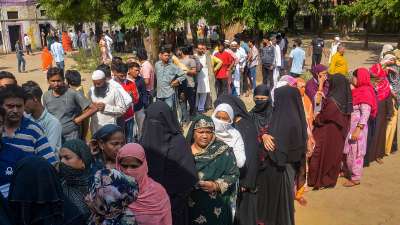As India approaches the parliamentary elections of 2024, the political landscape is rife with discussions on various critical issues. Among these, the Citizenship Amendment Act (CAA), which has yet to be fully implemented, is anticipated to dominate the election discourse more than other significant issues like the Ram Temple in Ayodhya and the abrogation of Article 370, both of which have already been addressed by the Bhartiya Janata Party (BJP).

The CAA, passed in December 2019, aims to provide a pathway to Indian citizenship for non-Muslim minorities (Hindus, Sikhs, Buddhists, Jains, Parsis, and Christians) from Pakistan, Bangladesh, and Afghanistan who faced persecution in their home countries. Despite its passage, the CAA has not yet been fully implemented, primarily due to delays in framing the necessary rules and widespread protests against it.
The delay in implementation has led to ongoing debates and controversies. Opponents argue that the CAA, coupled with the National Register of Citizens (NRC), could potentially marginalize India’s Muslim population, threatening the secular fabric of the nation. Proponents, including the BJP, maintain that the CAA is a humanitarian effort to protect persecuted minorities. As a result, the CAA remains a potent electoral issue, likely to be a focal point in the BJP’s campaign rhetoric as it seeks to consolidate its support base and address the concerns of various communities.
While the Ram Temple remains a symbol of the BJP’s commitment to its core Hindu nationalist agenda, its resolution means it might not generate the same intensity of discussion in the upcoming elections. The temple is a point of pride and achievement for the BJP, but with the construction , it serves more as a testament to the party’s past promises kept rather than a future issue to be addressed.
Similarly, the abrogation of Article 370 in August 2019, which revoked the special status of Jammu and Kashmir, was another significant accomplishment for the BJP. This move was aimed at integrating the region more closely with the rest of India, promoting development and curbing separatism. While it remains a critical aspect of the BJP’s political narrative, especially in terms of national security and territorial integrity, it is now a past action rather than a future promise.
In the 2024 elections, the BJP is likely to highlight its achievements with the Ram Temple and Article 370 as evidence of its ability to deliver on its promises. However, with these issues largely resolved, the CAA stands out as an unresolved promise that requires attention. The BJP may leverage the narrative of fulfilling the CAA to appeal to its core voter base and to address the concerns of non-Muslim refugees who view the act as a lifeline.
Furthermore, the CAA can serve as a counterpoint to the opposition’s criticism of the BJP’s governance. By focusing on the humanitarian aspects of the CAA, the BJP can attempt to project itself as a party that cares for persecuted minorities, thereby framing the debate in terms favorable to its ideology.
The opposition parties are likely to exploit the CAA’s contentious nature to galvanize their voter bases, particularly among secular and minority communities. They will emphasize the potential discriminatory aspects of the CAA and the threat it poses to the secular ethos of India. Additionally, the opposition may highlight the government’s delay in implementing the CAA as a failure to fulfill its promises, thereby questioning the BJP’s effectiveness.
The 2024 parliamentary elections in India will undoubtedly see the CAA taking center stage in political discussions. While the Ram Temple and the abrogation of Article 370 remain significant achievements for the BJP, their resolution shifts the focus to the pending promise of the CAA. This issue not only reflects ongoing societal debates but also underscores the BJP’s commitment to its ideological goals. As both the BJP and the opposition gear up for the elections, the discourse surrounding the CAA will be pivotal in shaping the electoral outcomes, making it a crucial battleground for garnering public support.



Leave a Reply